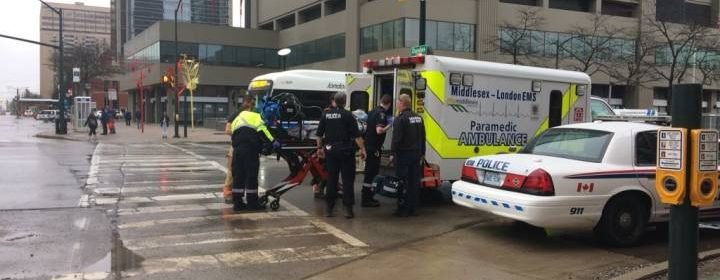How London’s foot patrol officers are handling a growing number of opioid-related calls

Police officers citywide are fielding roughly three or four overdose calls per day, according to the man in charge of the London police’s foot patrol unit.
Sgt. Mike Pottruff heads up a team of 16 uniformed foot patrol officers, who walk and cycle through downtown and the Old East Village and are “one phone call away” for business owners and members of the public.
“On a regular basis, we’re doing shoplifting calls, we’re doing trouble with person calls, we’re doing trespasser calls,” he said. But Pottruff has also noticed an increase in issues of homelessness, drug addiction and mental health concerns since the period when he was a foot patrol constable between 2012 and 2014.
“As part of the officers’ duties, (we) are dealing with those issues on a far larger scale than we ever used to,” he explained.
Pottruff couldn’t pinpoint the exact number of overdoses to which his officers have responded, but he said foot patrol officers are frequently called with reports of a person being high and behaving erratically. And he also notes a disparity between what the public thinks a police officer can do and what officers can actually do.
“Someone that’s drunk downtown, maybe causing a disturbance … if that person is a danger to themselves or others, we can arrest that person, take them to jail until they sober up, and typically, the problem has been solved,” he explained.
But it’s different when someone is high, Pottruff says.
“There’s no legislation right now that enables us to take that person into custody,” he explained.
“We do show up, we do try to contain the situation as much as possible. There’s no apprehension, there’s no arrest authority for us… Typically, what happens if there’s no crime that’s been committed, we try to get that person to leave the area, and hopefully, they do and they move on to the next block, where maybe it starts up all over again, which we do see a fair bit, and we can chase that person around, essentially for a whole entire day.”
Pottruff acknowledges that even if police officers had the authority to bring a person under the influence of drugs somewhere, there’s no place to go — and it might not be helpful to the individual, either.
“There’s an amount of sympathy we have, and… I can guarantee you, all my officers would say: ‘Arresting this person under the influence of meth is not the answer for that person.’ We’re not going to arrest our way out of this situation,” Pottruff said.
Health officials have been urging people who use drugs not to use alone so that there’s someone who can call for help or administer naloxone in case of an overdose. Pottruff wasn’t able to say whether there will be an increase in people using alone during the summer or if the likelihood of being alone would contribute to an increase in overdose-related deaths.
But he expects London’s social issues will become more visible.
“Someone inside may be worse off if they’re having an overdose, depending on if they have someone with them,” he said.
“On a street corner, someone’s going to notice that, if someone’s overdosing. Hopefully, someone’s going to notice that.”
Sign up for our Health IQ newsletter
© 2019 Global News, a division of Corus Entertainment Inc.
Source: Read Full Article